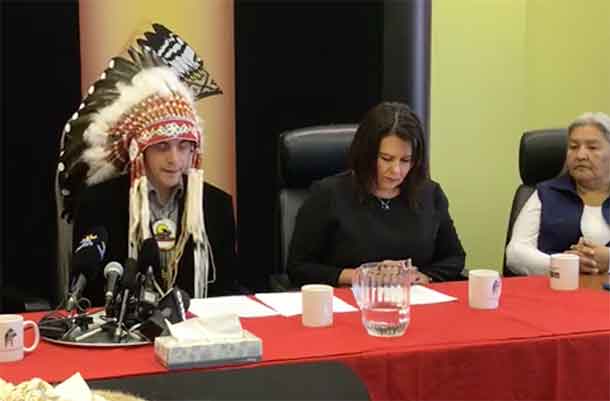WINNIPEG – The Assembly of Manitoba Chiefs (AMC) held its 31st annual general assembly this week at Brokenhead First Nation.
On the agenda were critical issues: a leadership crisis involving the Assembly of First Nations (AFN) regional chief for Manitoba, education for Indigenous youth, and a split amongst First Nations over the federal government’s recent bill on Indigenous child welfare.
I’d say more about these discussions, but I can’t. Media was banned from the meetings.
On Wednesday, reporters arrived to see a “No Media Allowed” sign at the door, barring entry.
Media and the public are occasionally asked to not attend sections of chiefs meetings — especially when private, political and internal matters are discussed. But never the entire assembly itself.
It’s all due to an ongoing controversy regarding AMC Grand Chief Arlen Dumas, who has been accused by multiple women of sending them unwanted texts and online messages.
Dumas has denied all allegations. He said the messages were by an impersonator, and his cellphone was “spoofed” (software used to make messages appear they come from a specific phone number).
This has come at a bad time for AMC, which is facing a number of critical matters. For example: the unprecedented move by Manitoba’s chiefs to hold a non-confidence vote on AFN regional chief Kevin Hart.
The position of AFN regional chief is a contentious one, as that person is selected by the AMC to represent Manitoba at AFN meetings and committees. For the past two years, Hart has clashed with Dumas and other chiefs on several issues, creating a question of who speaks for Manitoba’s First Nations.
Hart survived the vote, but now there is a growing schism between the AMC and AFN. With major issues on the horizon involving federal government resource use in Manitoba and consultation with First Nations, confusion regarding who will lobby for the province’s First Nations won’t help.
Speaking of policy, Dumas and many chiefs within AMC have rejected the federal government’s new child-welfare bill (C-92), saying it doesn’t transfer control over Indigenous children to First Nations but instead creates Indigenous-run bodies under federal control.
However, one of Manitoba’s two regional First Nations organizations, the Southern Chiefs’ Organization — representing half of AMC members — voted in June to support the legislation.
When debate is closed and access denied, tactics can be perceived to taint organizations and decisions.
The AMC now has some members openly talking to the federal government about working under C-92 and members fighting against it. This surely raises the question for some chiefs: Why participate in an organization openly working against your interests?
The AMC is not a government. It’s also not a political party that demands a single voice. The closest analogy to the AMC is the United Nations for Manitoba. A hallmark of the UN is nations come together to speak openly and frankly in front of the world on the issues facing everyone.
This doesn’t happen when the AMC assembly — arguably the only real opportunity the public has to see the work chiefs do in Manitoba — closes its doors to media.
When debate is closed and access denied, tactics can be perceived to taint organizations and decisions.
Which leads to one last issue coming up time and again about the AMC: the increasing role of a former leader of the Manitoba Liberal party at each level of First Nations leadership.
During the 2017 election for grand chief at the Southern Chiefs’ Organization (which I chaired), former Grit leader Rana Bokhari and other provincial Liberals were openly lobbying for eventual winner Jerry Daniels.
Bokhari was the campaign chairwoman for Dumas during his election as the AMC grand chief in 2017.
Bokhari was also a lead campaigner for Garrison Settee in 2018, when he was elected grand chief of Manitoba Keewatinowi Okimakanak, the northern organization.
There is a direct connection between the former leader of the Manitoba Liberal party and the three grand chiefs of Manitoba. This leads to every decision surrounding the AMC to be scrutinized. For instance, in their closed-door meeting, Manitoba’s chiefs chose to endorse the NDP in the upcoming provincial election.
It’s yet another unprecedented decision: the AMC is supposed to not involve itself in politics and allow First Nations to work independently and autonomously.
Bokhari’s rivalry with Liberal Leader Dougald Lamont is well-documented. What role did this play in this endorsement?
I’d say more, but we weren’t allowed to cover the meeting.
 Niigaan Sinclair
Niigaan Sinclair
Originally appeared in the Winnipeg Free Press on August 3, 2019. Republished with the permission of the author






